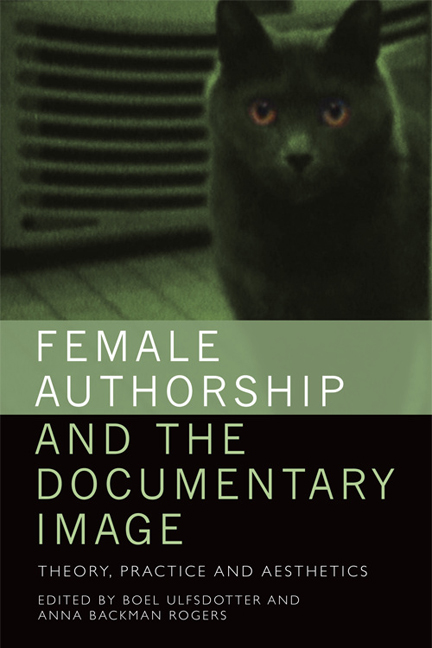Book contents
- Frontmatter
- Contents
- List of Illustrations
- Notes on the Contributors
- Foreword
- Introduction
- PART ONE DOCUMENTARY PRACTICES
- PART TWO DOCUMENTARY THEORIES
- PART THREE FEMALE AUTHORSHIP AND GLOBAL IDENTITIES
- ‘Being a Woman Documentary Maker in Taiwan’ – An interview with Singing Chen and Wuna Wu
- Select Bibliography
- Index
10 - Constructing an Intimate Sphere through her Own Female Body: Naomi Kawase’s Documentary Films
Published online by Cambridge University Press: 05 May 2021
- Frontmatter
- Contents
- List of Illustrations
- Notes on the Contributors
- Foreword
- Introduction
- PART ONE DOCUMENTARY PRACTICES
- PART TWO DOCUMENTARY THEORIES
- PART THREE FEMALE AUTHORSHIP AND GLOBAL IDENTITIES
- ‘Being a Woman Documentary Maker in Taiwan’ – An interview with Singing Chen and Wuna Wu
- Select Bibliography
- Index
Summary
Japanese female director Naomi Kawase (1969–) came into critical prominence with works such as Suzaku (Moe no suzaku, 1997) and Mogari: The Mourning Forest (Mogari no mori, 2007), both of which won prizes at the Cannes Film Festival. Born and raised in Nara, Japan, she started filmmaking in earnest soon after graduating from a film college. Since then, her consistent efforts and the presentation of her works at various international film festivals have won her a global reputation as one of Japan's most prominent female film directors, particularly on the arthouse and film festival circuit.
Although Kawase's works are recognised internationally and not only in her home country, there is a paucity of academic commentary on her work. This could be connected to the general tendency in film scholarship that, whilist female involvement in both industry and independent filmmaking (especially documentary filmmaking) is growing these days, not enough attention has been paid in terms of academic inquiry. Therefore, by analysing Kawase's documentary films as a pivotal practice in women's documentary filmmaking, this chapter aims to complement the insufficient research into female authorship, within the Japanese film production context.
Since the late 2000s, Kawase has largely been known for fictional works such as Mogari or Sweet Bean (An, 2015). She originally started her career, however, as a documentary filmmaker, and more than half of her works are documentaries. One of the most interesting aspects of her documentaries is that the majority of them reflect her own life experiences. Embracing (Ni tsutsumarete, 1992), which was released when she was twenty-four years old, centres on her own process of internal reflection on a father from whom she had been separated for a long period, and uses a journey format that culminates in a temporary reunion with him. We can also see similar autobiographical elements in films such as Katatsumori (1994), a portrayal of her everyday life with her foster mother, and Kya Ka Ra Ba A (aka Sky, Water, Fire, Wind, Earth, 2001), which details her reminiscing for her father, who had passed away just before she started to make this film. What she focuses on in these films, however, is not only the figure of herself, but also the relationship she has with the people surrounding her.
- Type
- Chapter
- Information
- Female Authorship and the Documentary ImageTheory, Practice and Aesthetics, pp. 171 - 185Publisher: Edinburgh University PressPrint publication year: 2018



